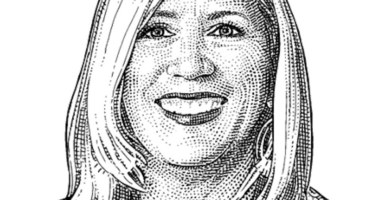
The Donald Trump years have broken any number of hallowed political and media institutions, so why should the most hallowed political-media institution of them all, the Sunday show, escape unscathed? Yes, those self-important shows with their self-important anchors have never been as crucial to our constitutional system as they like to imagine. But they have at least provided a refuge from the soft-focused fecklessness of the networks’ evening news and the shrieking of the prime-time carnival barkers on cable.
That changed during Trump’s presidency. In some instances, the shows were less about educating the viewing audience than flattering an audience of one. “The reality is that the president is a political genius,” Stephen Miller told Jake Tapper on CNN’s “State of the Union” during a contentious interview in 2018. “I’m sure he’s watching and is happy you said that,” Tapper told Miller. (Trump soon tweeted a link to the segment, praising Miller.)
Even worse, the shows became platforms for disinformation. In October 2019, Chuck Todd invited Ron Johnson, a Republican senator from Wisconsin, on “Meet the Press” to discuss the revelation that Trump had withheld military aid to Ukraine unless the country’s president agreed to investigate the business dealings of Hunter Biden. Johnson previously told The Wall Street Journal that he “winced” when he learned those two issues were connected. But when Todd asked about that report — “What made you wince?” — Johnson launched into a conspiracy theory about the origins of Robert Mueller’s Russia investigation. “I have no idea why we’re going here,” Todd complained.
Two months later, Ted Cruz, a Republican senator from Texas, reached out to “Meet the Press” to discuss the Ukraine scandal. As Todd later told Rolling Stone, he assumed that Cruz, an avowed Russia hawk, wanted to push back against a Russian disinformation campaign. But when Todd asked Cruz whether he thought Ukraine tried to sway the 2016 elections, Cruz replied, “I do.” “You do?” Todd asked in disbelief. “Here’s the game the media is playing,” Cruz said. “Because Russia interfered, the media pretends nobody else did.” Looking back on the interview, Todd told Rolling Stone: “He wants to use this for some sort of appeasement of the right. I didn’t know what else to think.”
Todd appears to have done a good deal of thinking about the plight of the Sunday show. In 2018, he wrote a cri de coeur for The Atlantic about “a nearly 50-year campaign to delegitimize the press,” imploring his colleagues to fight back: “It means not allowing ourselves to be spun, and not giving guests or sources a platform to spin our readers and viewers, even if that angers them.” A few months later, Todd hosted an episode of “Meet the Press” dedicated to climate change and made a point of not inviting any climate-change deniers.
Source: | This article originally belongs to Nytimes.com









